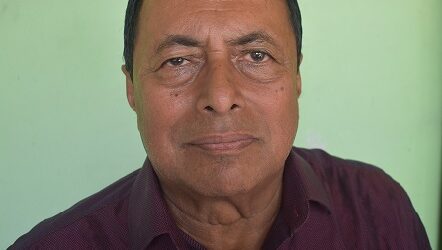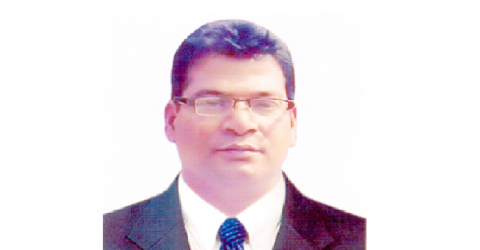
Nayeem Islam Nibir
Troubled by economic woes, Sri Lanka has failed to repay 51 billion in foreign debt. In this situation, on 12 April, Sri Lanka declared itself bankrupt. According to the central bank, it is not possible for Sri Lanka to repay any foreign loan in the current situation. However, Sri Lanka has a “perfect record” of debt repayments in the past. The central bank has said that the country’s reserves need to be maintained to keep imports of essential materials like fuel. Lenders who have lent to a company or country can foreclose on their assets. This approach has been mentioned in the case of interest collection. A state of emergency has been declared in the wake of the protests. During the strike, shops were closed and public transport was also stopped. The country of 22 million people has suddenly come to a virtual standstill.
Since independence from Britain in 1948, there has been a catastrophic shortage of food and fuel, including record inflation and blackouts. The Sri Lankan people have stormed the homes of many government officials in a fit of rage. Sri Lankans are protesting on various issues like electricity, fuel oil, emergency medicine, food crisis. All 26 ministers in the government have resigned. Many people have been arrested for causing unrest. Many of those arrested said they had been tortured in police custody. Opposition parties have already rejected the president’s offer to form a unity government. The country has never been in such a predicament since independence.
There are many reasons for such a catastrophic situation in Sri Lanka; Which has accumulated over many days. In September 2021, President Gotabaya declared an economic emergency in Rajapaksa. According to the Central Bank of Sri Lanka, they now have only 2 billion in foreign exchange reserves. From the country’s debt, GDP has increased from 85 percent in 2019 to 104 percent in 2021. The current shortage of foreign exchange has made it extremely difficult to get supplies of essential commodities including fuel, electricity, paper, milk powder. The country is facing hours of power outages every day, and even printing of newsprint has stopped due to lack of paper.
In March of this year, the general inflation rate in the country was more than 17 percent. The food inflation rate was 30.2 percent. And this has created a terrible situation in the Sri Lankan economy. The mainstream media in Sri Lanka is reporting that this is an ineffective administrative measure that has led to the current crisis. In such a situation in Sri Lanka, some Western media are falsely claiming that it is China’s ‘debt trap’ that has plunged Sri Lanka into an economic crisis. Sri Lankan government figures show that the country’s debt structure is complex. Colombo borrowed the most from the global capital market, accounting for 47 percent of total loans, followed by the Asian Development Bank at 13 percent, Japan at 10 percent, China at 10 percent, the World Bank at 9 percent and India at 2 percent. This proves that the so-called ‘debt trap’ is not related to any truth. This is a fabricated western trap to confuse Sri Lankans and the international community.
Over the past decade, Sri Lanka has borrowed only 6 billion from China. Sovereign bonds are another major source of debt. In 2007, the government issued a sovereign bond. Sovereign bonds are sold when expenses exceed income. The bond has a debt of 12.5 billion. The central bank said it had repaid 2.5 million in foreign loans. Sri Lanka paid 500 million rupee in January this year. As a result, their reserves are strained. Due to this the country is not able to import oil and other essential commodities. The government’s various luxury projects are also thought to have hit the economy. In the last 15 years, Sri Lanka has undertaken many mega projects on seas and airports, roads and highways, many of which have become a reality. Colombo Port City is being built by rescuing land from the sea near the capital Colombo. The project is estimated to cost 1.5 billion dollar. It will take 26 years to complete. The Sri Lankan government is building the city to compete with Dubai, Singapore and Hong Kong. Sri Lanka is implementing this project together with China. Sri Lanka has borrowed from various sources for many more such projects. Although many projects are not profitable even after spending huge amount of money.
After taking power in November 2019, the then President of Sri Lanka decided to reduce VAT and taxes. The rate of VAT has been reduced from 15 percent to 8 percent. The main reason for the reduction in VAT was to stimulate the economy. Mahinda Rajapaksa took a similar initiative after the civil war in Sri Lanka in 2009. Due to which the economy of the war-torn country gained momentum. In that light, incumbent President Gotabaya Rajapaksa took similar steps to boost the economy. A few months after this incident, the covid epidemic began to have a negative impact. Reducing income tax and VAT reduces government revenue by up to 25 percent. The government has had to borrow more from abroad to handle the situation. Economic activity in the country almost came to a standstill for two years, with the thought that it would be possible to turn around after the end of covid. The decision to reduce taxes and VAT was not revoked due to lack of foresight of the government. As a result, Sri Lanka is heading towards a tragic outcome. On the other hand, Sri Lanka has to comply with the obligation to repay the loan. Therefore, the country as a whole is under severe economic pressure.
Sri Lanka’s tourism sector is a major source of income for the country. The tourism sector has been shut down for two years due to the corona virus infection. According to a BBC report, more tourists used to come from China before the epidemic, but due to strict corona restrictions in China, the flow of tourists from there has completely stopped. Another major channel for remittances is remittances sent by Sri Lankan nationals working abroad, with remittance inflows severely hampered by the epidemic. Before the corona virus epidemic, Sri Lanka had a revenue of 12 billion from the tourism sector. After coming to power in 2019, President Gotabaya Rajapaksa introduced organic farming in the country. The use of chemical fertilizers and pesticides in the country was completely stopped. On the other hand, due to the ban on import of fertilizers, the production of rice decreased by 20 percent. Rice country Sri Lanka imports 460 million worth of rice to meet food shortages. The price of rice has skyrocketed. Adverse effects of organic farming policies also affect Sri Lankan tea production. Earlier, Sri Lanka earned more foreign exchange by exporting tea. The government paid 200 million in compensation to keep the sector alive as production was disrupted. But even after that, the suffering of the people in the food shortage is evident all over the country.
In order to overcome the current crisis, Sri Lanka needs foreign currency or foreign borrowing at the moment. The country is being approached by many, the list includes China, India, Pakistan, Bangladesh, etc. Sri Lanka has devalued 15 per cent of its currency to get a loan from the IMF. At present one dollar is equal to 230 Sri Lankan rupees; It has risen to 316 rupees. Their import trade is stagnant. India has lent 1 billion to buy emergency food, medicine and fuel during the Sri Lankan crisis. Bangladesh stood by Sri Lanka with a 25 crore dollar ‘currency swap’ loan and donated emergency medicines worth 20 crore taka as part of its assistance in the wake of the ongoing crisis. Protesters in Sri Lanka have staged a huge protest in front of the building of President Gotabhaya Rajapaksa. This demonstration of the people is considered to be the result of the collapse of his public support. When he came to power, he promised development of the country, development of economy and firmly holding the helm of the country. Promises were also made to make the country a welfare state. Ordinary people are protesting now as none of this has been achieved. After taking power, Rajapaksa’s massive tax cuts and import bans have further aggravated the current situation.
Critics say the main reason for the current situation in Lanka is corruption and nepotism. President Gotabha’s brothers and nephews are in important ministries of the country. His brother Mahinda Rajapaksa, who had previously served two terms as president, resigned on May 9. They also have relatives in other important organizations. Despite the power crisis in the country, uninterrupted power supply to their families continues. The grandeur of the Rajapaksa family has also raised the level of public outrage. The current dire situation is actually a cloud of accumulated black clouds of the situation that has developed over the decades, with no one to take responsibility alone. Analysts blame leadership for mismanagement. The issue of coming to power in 2019 is also being claimed as incompetence, arrogance and corruption.
Short and long term plans are needed to get out of here. Exports and foreign investment must be increased. The revenue sector has to be streamlined and come out of unnecessary and luxurious projects. The reduction in VAT and income tax should have been withdrawn as the economy became more active in the aftermath of covid. The Sri Lankan government could have used India’s experience in organic farming. In India, the Modi government has not introduced organic farming in all the provinces. Sikkim is the first state in India where organic farming is legalized. As a result, experience with the ‘error and trial’ approach has led to similar decisions in other provinces. But at the moment, there is no magic way for Sri Lanka to get out of the mountain of foreign debt. It may be solved slowly.
Critics say allegations of incompetent government administration, false election promises and parasitic theft of public property have been leveled against the political leadership; It is now being witnessed that people are taking to the streets to demand their resignation. The government is trying to control the situation with tear gas, water cannons and curfew. It is a matter of analysis as to whether the move will improve the situation or worsen it. But if we fail to take proper action, the country will fall into anarchy and become hell. The country has a constitution that everyone must abide by; Otherwise the situation of Sri Lankans could be dire. The revolutionary government will not have any magic formula. Contrary to the current situation in Sri Lanka, minimum governance is not seen as a remedy. During this crisis, I have seen in Parliament that the people’s mental anguish is being aroused only by constantly fighting against the previous wrongdoings of their predecessors. Everyone is trying to fish in muddy waters. The people of Lanka are educated and have a good knowledge of the modern world. It remains to be seen how the current parliament can cope with the growing public outcry.
Nayeem Islam Nibir is a young generation political leader and columnist
in Bangladesh. He can be reached : [email protected]



